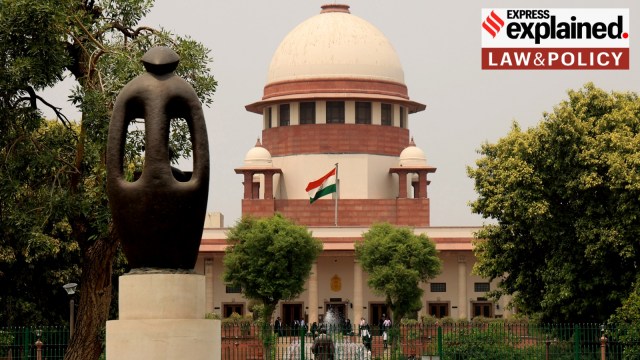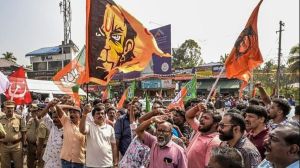The Supreme Court on Monday (December 9) heard a PIL stating that the Sexual Harassment of Women at Workplace (Prevention, Prohibition and Redressal) Act, 2013 (POSH Act) should apply to political parties.

The POSH Act requires both public and private workplaces to set up an Internal Complaints Committee (ICC) to hear complaints of sexual harassment. The plea in question claims that when it comes to political parties “the presence of Internal Complaints Committees (ICCs) to address sexual harassment is inconsistent”.
This case has sparked a conversation on how the POSH Act applies — if at all — to organisations like political parties, which often lack a traditional workplace structure.
Who does the POSH Act apply to?
Section 3(1) of the POSH Act states that “No woman shall be subjected to sexual harassment at any workplace”. This immediately tells us how the POSH Act will apply — at the workplace, and only when the aggrieved party is a woman.
The definition of “workplace” in the POSH Act is expansive. It includes organisations, institutions, and so on in the public sector which are “established, owned, controlled or wholly or substantially financed by funds provided directly or indirectly by the appropriate Government”, as well as organisations in the private sector, hospitals, nursing homes, sports venues, houses, and even covers locations visited by an employee “during the course of employment”.
However, the prospect of applying the Act becomes murky when it comes to political parties. Before the current PIL was filed at the SC, a court has only ever addressed this question once when the Kerala High Court decided the case of Centre for Constitutional Rights Research and Advocacy v State of Kerala & Ors (2022). The court heard several petitions seeking the establishment of ICCs in television, film, news, and political organisations — including the BJP and Congress.
Story continues below this ad
On the subject of political parties, the court held that there is no “employer-employee relationship with its members” and political parties do not carry out “any private venture, undertaking, enterprises, institution, establishment, etc. in contemplation of a ‘workplace’ (under the POSH Act)”. As such, the court held that political parties “are not liable to make any Internal Complaints Committee”.
Could the POSH Act apply to political parties?
The Representation of People Act, 1951 (RP Act), governs how to register a political party. Under Section 29A “Any association or body of individual citizens of India calling itself a political party” must make an application for registration with the ECI. This application must provide details including the name of the party, the State where its head office is situated, the names of office bearers, details of local units, and number of members.
The application must also contain a memorandum of rules and regulations, and must contain a provision stating that the party “shall bear true faith and allegiance to the Constitution of India”. However, the POSH Act hangs its hat on protecting women from sexual harassment in the “workplace”, which can be difficult to determine for a political party.
Party workers, for instance, who parties tend to employ in droves, often have little interaction with high-level officials and are hired temporarily to operate on the field without a defined “workplace”. Moreover, if the court or the ECI does decide to make the POSH Act applicable to political parties, it will have to clarify who the “employer” is in the context of a political party as the employer is responsible for setting up the ICC to handle cases of sexual harassment at the workplace.
Story continues below this ad
That said, the term “workplace” under the POSH Act includes locations visited by an employee “during the course of employment” which could conceivably allow the Act’s protections to extend to party workers in the field. The POSH Act also provides a wide definition for the term “employee”, and includes people who are employed temporarily, contract-workers, or volunteers “with or, without the knowledge of the principal employer”.
Further, party Constitutions often provide organisational hierarchies which could help determine who the “employer” would be. The BJP ‘Constitution and Rules’ for instance provides details of a seven-level organisational structure beginning with Local Committees up to the national level, with an exhaustive list of members and office bearers at each level.
Currently, parties handle internal discipline through their committees. The Congress’ Constitution and Rules, for instance, creates a hierarchy of committees and allows higher level committees to take action against committees and individual members that are subordinate to it. The BJP Constitution establishes a “Disciplinary Action Committee” at the national and state levels.
Both Constitutions list actions that would be considered “Breach of Discipline”. But sexual harassment could conceivably only fall under one of the broad headings such as “Acting in a way calculated to lower the prestige of the Party…” (BJP with a similar breach listed in the Congress Constitution) or “Being guilty of offences involving moral turpitude…” (Congress Constitution). There is also no requirement for these committees to have women or external members, as would be required of an ICC under the POSH Act.
Story continues below this ad
What has ECI’s stand been on getting political parties to comply with other laws?
The ECI derives its authority from Article 324 of the Constitution, which vests it with the power of superintendence, direction and control of elections to the Parliament, State legislatures, office of President and office of the Vice-President. These powers are further strengthened by the RP Act.
While its role has been defined in the RP Act clearly, when it comes to other laws, it’s not as well-defined. For instance, the Central Information Commission (CIC) had ruled in 2013 that the Right to Information Act, 2005, was applicable to political parties too. Since then, there have been petitions filed in the Supreme Court seeking directions to parties to appoint public information officers. But parties are yet to do so.
Which leaves the question of how is the ECI handling the issue? For its part, the ECI has said it adheres to the CIC order. In a press statement on May 28, 2018, the ECI said “Election Commission of India goes by the CIC order of 3rd June, 2013 that national parties would be public authorities for the purposes of RTI Act and in pursuance of this all the information about the contributions received by them as well as their annual audited accounts, as and when submitted to the Commission are put in public domain.”
The ECI also adopts the approach of issuing advisories to parties in furtherance of other laws. For instance, the ECI instructed parties ahead of the 2024 Lok Sabha elections not to involve children in campaigning, as per the Child Labour (Prohibition and Regulation) Act, 1986.







































